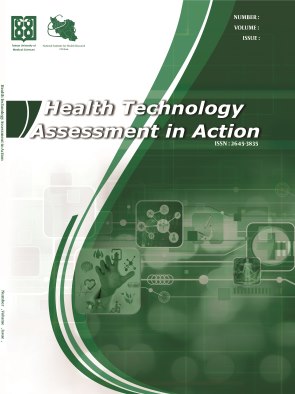Strategies for Mindful Parenting During COVID-19 Pandemic: A Systematic Review
Abstract
Introduction: Covid-19 has affected lives of people in all aspects. One of the most important and yet neglected aspects is parenting and the experience of mindful parenting for kids and their parents. This study aims to systematically review the strategies for mindful parenting during covid-19 outbreak.
Methods: this is a systematic review in which all related databases and search engines- Web of Science, Scopus, PubMed, Google Scholar, SID (Persian)- used to explore and search the most relevant articles that had addressed mindfulness in parenting during covid-19 pandemic. a content analysis approach was applied for categorizing and analysis of the data. Codes were specified to every useful strategy and when coding finished, these codes were put in different themes and subthemes subjectively, using a framework thematic analysis.
Results: Out of 2036 records, 45 had the potential for being considered for next screening stage. 3 final articles met the pre-defined inclusion criteria. The two dimension of mindfulness was considered as two subgroups for strategies identified for improving the mindfulness in parenting in final articles: being in the moment and non-judgmental approach.
Conclusion: strategies like mindfulness in parenting are becoming more and more necessary for enhancing the quality of life for kids and their parents. In order to do so, there is a need for policy makers and planners to facilitate the practice of parenting by social support systems and adjusting to the new situation which will be on the agenda for a while.
2. Salari N, Hosseinian-Far A, Jalali R, Vaisi-Raygani A, Rasoulpoor S, Mohammadi M, et al. Prevalence of stress, anxiety, depression among the general population during the COVID-19 pandemic: a systematic review and meta-analysis. Globalization and health. 2020;16(1):1-11.
3. de Miranda DM, da Silva Athanasio B, de Sena Oliveira AC, Silva ACS. How is COVID-19 pandemic impacting mental health of children and adolescents? International Journal of Disaster Risk Reduction. 2020:101845.
4. Xue Q, Xie X, Liu Q, Zhou Y, Zhu K, Wu H, et al. Knowledge, attitudes, and practices towards COVID-19 among primary school students in Hubei Province, China. Children and youth services review. 2021;120:105735.
5. Huber SG, Helm C. COVID-19 and schooling: evaluation, assessment and accountability in times of crises—reacting quickly to explore key issues for policy, practice and research with the school barometer. Educational Assessment, Evaluation and Accountability. 2020;32(2):237-70.
6. Hassani F, Shahrbanian S, Shahidi SH, Sheikh M. Playing games can improve physical performance in children with autism. International Journal of Developmental Disabilities. 2020:1-8.
7. Cluver L, Lachman JM, Sherr L, Wessels I, Krug E, Rakotomalala S, et al. Parenting in a time of COVID-19. Lancet. 2020;395(10231).
8. Winkler P, Formanek T, Mlada K, Kagstrom A, Mohrova Z, Mohr P, et al. Increase in prevalence of current mental disorders in the context of COVID-19: analysis of repeated nationwide cross-sectional surveys. Epidemiology and psychiatric sciences. 2020;29.
9. Liu JJ, Bao Y, Huang X, Shi J, Lu L. Mental health considerations for children quarantined because of COVID-19. The Lancet Child & Adolescent Health. 2020;4(5):347-9.
10. Brown SM, Doom JR, Lechuga-Peña S, Watamura SE, Koppels T. Stress and parenting during the global COVID-19 pandemic. Child abuse & neglect. 2020;110:104699.
11. Gunzenhauser C, Enke S, Johann V, Karbach J, Saalbach H. Parent and Teacher Support of Elementary Student’s Remote Learning During the COVID-19 Pandemic. Bildung und Corona 22–2304 2021.42.
12. Moore SA, Faulkner G, Rhodes RE, Brussoni M, Chulak-Bozzer T, Ferguson LJ, et al. Impact of the COVID-19 virus outbreak on movement and play behaviours of Canadian children and youth: a national survey. International Journal of Behavioral Nutrition and Physical Activity. 2020;17(1):1-11.
13. Moline RL, Chambers C, McMurtry CM. Study protocol for a randomized controlled trial of a child and parent mindfulness intervention for pediatric venipuncture. Paediatric and Neonatal Pain. 2021;3(1):20-8.
14. Duncan LG, Coatsworth JD, Greenberg MT. A model of mindful parenting: Implications for parent–child relationships and prevention research. Clinical child and family psychology review. 2009;12(3):255-70.
15. Bögels SM, Lehtonen A, Restifo K. Mindful parenting in mental health care. Mindfulness. 2010;1(2):107-20.
16. Dreyfus G. Is mindfulness present-centred and non-judgmental? A discussion of the cognitive dimensions of mindfulness. Contemporary Buddhism. 2011;12(1):41-54.
17. Bögels S, Restifo K. Mindful parenting: A guide for mental health practitioners: Springer; 2013.
18. Page MJ, McKenzie JE, Bossuyt PM, Boutron I, Hoffmann TC, Mulrow CD, et al. The PRISMA 2020 statement: an updated guideline for reporting systematic reviews. Bmj. 2021;372.
19. Singh J. Critical appraisal skills programme. Journal of pharmacology and Pharmacotherapeutics. 2013;4(1):76.
20. Coyne LW, Gould ER, Grimaldi M, Wilson KG, Baffuto G, Biglan A. First things first: parent psychological flexibility and self-compassion during COVID-19. Behavior analysis in practice. 2020:1-7.
21. Fernandes DV, Canavarro MC, Moreira H. Postpartum during COVID‐19 pandemic: Portuguese mothers' mental health, mindful parenting, and mother–infant bonding. Journal of Clinical Psychology. 2021.
22. Fuller JL, Fitter EA. Mindful parenting: a behavioral tool for parent well-being. Behavior analysis in practice. 2020;13(4):767-71.
| Files | ||
| Issue | Vol 5, No 4 (2021) | |
| Section | Articles | |
| DOI | https://doi.org/10.18502/htaa.v5i4.10171 | |
| Keywords | ||
| mindfulness parenting Covid-19 strategy | ||
| Rights and permissions | |

|
This work is licensed under a Creative Commons Attribution-NonCommercial 4.0 International License. |




